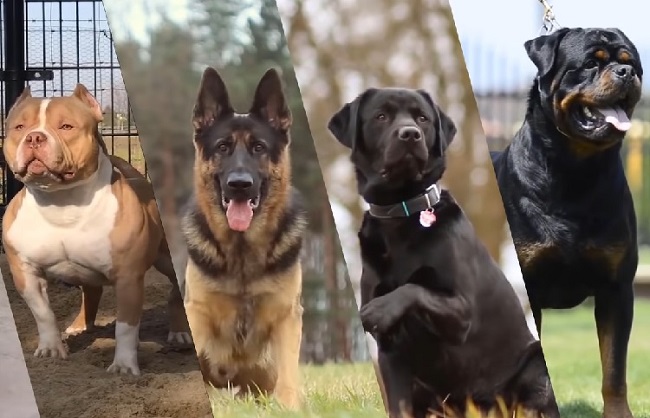Understanding dog behaviour is crucial to fostering a harmonious bond with your canine companion. One aspect of this is comprehending the breeds known for a higher biting frequency.
While it’s important to remember that a dog’s temperament can significantly vary based on individual factors, certain breeds tend to exhibit biting tendencies more often due to genetics, environment, or training.
Let’s delve into the world of dog breeds that bite the most, providing you with everything you need to know.

Breeds of Dogs That Bites The Most
Here are some of the breeds of Dogs That Bites The Most:
Read Also:
Chihuahua
Despite their small size, Chihuahuas are often known for their aggressive behaviour. Their biting tendency usually comes from their robust personalities, coupled with a strong desire to protect themselves and their owners. Proper socialization from an early age can help mitigate this behaviour.
German Shepherd
German Shepherds are known for their protective nature, and when not appropriately socialized or trained, they can resort to biting as a defensive mechanism. They’re intelligent, loyal dogs and with the right training, they can be wonderful companions.
Pit Bull
Pit Bulls have a controversial reputation for aggression, which is often due to their historical role as fighting dogs. Despite this, Pit Bulls can be friendly and loving pets when appropriately trained and socialized.
Any aggressive behaviour, including biting, is usually the result of improper handling or training.
Rottweiler
Rottweilers are powerful dogs that are naturally protective, which can lead to aggressive behaviours if not correctly managed. They need rigorous training and socialization from a young age to cultivate a balanced temperament. With the right approach, Rottweilers can be gentle and affectionate family pets.
Jack Russell Terrier
Jack Russell Terriers are energetic and fearless dogs that were initially bred for hunting. Their assertive nature can lead to biting behaviours, especially when they feel threatened or overly excited. These dogs require consistent training and plenty of exercise to channel their energy positively.
Cocker Spaniel
While Cocker Spaniels are generally friendly and affectionate dogs, some can show aggressive tendencies, including biting.
This behaviour is often linked to a syndrome called “Rage Syndrome,” which is relatively rare but can occur in this breed. Regular training and early socialization are key to mitigating aggressive behaviours.
Akita
Akitas are strong, independent dogs known for their protective instinct. In some cases, this instinct can lead to biting if they perceive a threat to themselves or their family. A well-trained and socialized Akita can, however, make a loyal and loving pet.
Breed-Specific Legislation (BSL) and Controversy
Some jurisdictions have breed-specific legislations (BSL) in place, restricting or even banning the ownership of breeds like Pit Bulls and Rottweilers due to their perceived aggression.
However, these laws are highly controversial, with many experts arguing that they are ineffective and unfairly penalize responsible owners and innocent dogs.
Instead of focusing on specific breeds, these experts advocate for responsible pet ownership, including proper training and socialization for all dogs, regardless of breed.
Understanding Dog Bites and Aggression
Dog aggression is a complex issue that extends beyond just biting. It can involve growling, barking, or snapping. Certain breeds may display aggressive behaviours more frequently due to their history, such as breeds historically used for guarding or fighting.
However, aggression can also stem from factors like fear, pain, or inadequate socialization.
Understanding the root causes of your dog’s aggressive behaviour can help manage it more effectively. A professional dog trainer or a veterinary behaviorist can provide valuable insights and offer a tailored approach to managing and mitigating aggression in dogs.
The Role of Training and Socialization
Proper training and socialization from an early age can significantly reduce the likelihood of a dog becoming aggressive or biting.
Socialization exposes your dog to different situations, environments, and individuals (both humans and other animals), helping them become more comfortable in various scenarios. Training, on the other hand, provides dogs with clear guidelines for appropriate behaviour.
Both training and socialization are essential for all dogs, but they can be especially critical for breeds prone to aggression. It’s also worth noting that these should be ongoing processes, not one-time events.
Ongoing training and socialization can help ensure that your dog remains well-adjusted and well-behaved throughout their life.
The Importance of Neutering
Neutering (or spaying, in the case of females) can also help reduce aggression in dogs. Several studies have found a correlation between intact male dogs and aggression, including biting.
Therefore, unless you plan on responsibly breeding your dog, neutering or spaying is generally recommended.
Read Also:
Conclusion
While the breeds mentioned above have been associated with a higher propensity for biting, it’s important to note that individual dogs within these breeds can and do defy these generalizations.
Aggressive behaviours, including biting, are often the result of improper socialization, insufficient training, or a lack of mental and physical stimulation. Therefore, dog owners must invest time and resources into understanding and training their pets.
By doing so, they can encourage positive behaviours, reduce aggressive tendencies, and foster a loving, harmonious relationship with their canine companions.
























